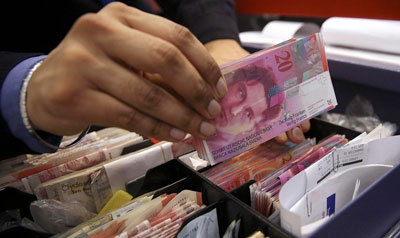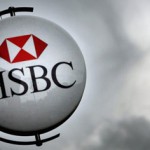Europe’s Plunging Borrowing Costs Mark Two New Milestones

Switzerland is first with 10-year bond at negative yield as Mexico lines up 100-year euro bond
Europe’s plunging borrowing costs marked two new milestones on Wednesday, with Switzerland becoming the first country ever to issue 10-year debt that gives investors a yield under 0%, and Mexico lining up a rare deal to borrow euros that it will repay a century from now.
Bond prices across Europe have rocketed this year in response to the European Central Bank’s massive stimulus package, crushing yields for investors and borrowing costs for issuers.
Several European countries inside and outside the eurozone have sold government debt with up to five years of maturity at negative yields, which means investors effectively pay for the privilege of buying it. But no other country has previously stretched this out as long as 10 years.
The Alpine country sold a total of 377.9 million Swiss francs (about $391 million) of bonds maturing in 2025 and 2049. On the 10-year slice, the yield was -0.055%, compared with 0.011% on its most recent similar bond two months ago.
In the post-issuance secondary market, Swiss bonds maturing up to 11 years in the future already trade with yields under 0%. But such low yields at the initial point of sale “illustrate well the world we live in,” said Jan von Gerich, chief strategist at Nordea,referring to collapsing yields on debt amid widespread stimulus from central banks around the world.
In January, Switzerland’s central bank scrapped its upper limit on the value of the franc and cut deposit rates to -0.75%. Swiss bonds are likely to remain attractive to investors as long as yields stand above that level.
“The combination of deflationary fears and aggressive central-bank action has caused investors to accept the reality of negative-yield bonds,” said Jeffrey Sica, chief investment officer of U.S.-based Circle Squared Alternative Investments. An auction with a negative yield “signals a lack of confidence from investors that the economy will be growing in the short term,” he added.
Mexico, meanwhile, is planning to sell a rare 100-year bond denominated in euros. Early indications suggest that it will yield around 4.5%. The country has previously sold century bonds in sterling and dollars.
Goldman Sachs and HSBC are book runners on the deal, which is expected to be priced today. This is the first 100 year euro denominated bond for Mexico, which has already sold £1 billion of sterling-denominated bonds in 2014 and it issued a 100-year dollar-denominated bond in 2010.
“With euro rates in negative terrain, Mexican sovereign risk looks pretty attractive, particularly in these terms,” said Marco Oviedo, chief economist for Mexico at Barclays.He expects a healthy demand from European investors.
The choice of euro-denominated issuance is a common theme at the moment, addedChristian Lawrence, emerging market strategist at Rabobank. “Participants can issue in euros and swap back to dollars at a better rate and that is one reason why euro-denominated issuance has been so popular,” he said.
Mexico is rated A3 by Moody’s, BBB+ by Standard & Poor’s and BBB+ by Fitch.
Source: WSJ




























